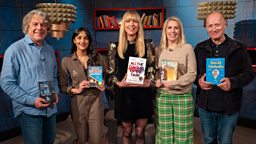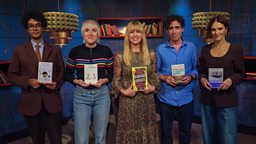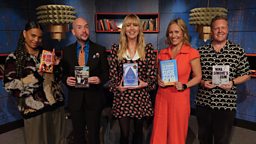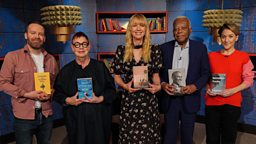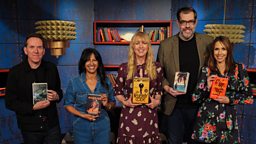Between the Covers 2024 Episode 2
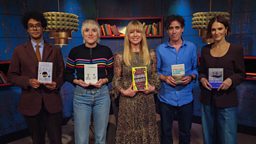
BYOB Recommendations - Episode 2
Each week on Between the Covers, host Sara Cox invites her guests to share their favourite titles. This week Stephen Mangan, Maisie Adams, Richard Ayoade and Elizabeth Day reveal their reading recommendations.
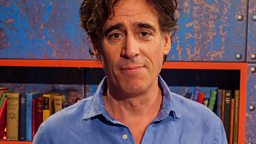
Stephen Mangan - A Goat's Song by Dermot Healy
The cover says:
I couldn't believe there was a book that's set in Belmullet, a little town in the west of Ireland and I was not prepared for it to be this absolute stone cold masterpiece.
Jack Ferris, playwright, drunk, is mired in contemplative misery in a fisherman's cottage on the windy bleak west coast of Ireland. Mourning his love affair with Catherine Adams, an actress and Protestant from the North, he summons her instead in his imagination. In doing so, he tells the story of her father Jonathan, failed parson and retired RUC man, shamed into exile by a moment of violence in Derry years ago.
Stephen says:
It's a book about a lost man who is struggling to cope with his drinking, with his writing, with his love affair. It's set in a really remote part of Ireland that my family come from and it's one of those places that never gets mentioned or talked about by anyone ever, so this is what first drew me to the book - I couldn't believe there was a book that's set in Belmullet, a little town in the west of Ireland and I was not prepared for it to be this absolute stone cold masterpiece. It's got melancholy, and it's got wit that I associate with that area.
The ‘goat’s song’ of the title refers to the idea that farmers used to put goats on two separate islands: You put the males on one island and the females on the other and of course, this would drive the males crazy, and it was their melancholy, mournful, bleating. It's very much from the male perspective, and it's about how his world falls apart when the women have gone and he just cannot get it together. It's one of my favourite books. It's written just before the Good Friday Agreement, so it's a lot about Protestant and Catholic mindsets, north and south Ireland, men and women. It’s a gorgeous, gorgeous book.
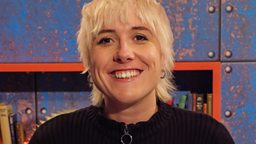
Maisie Adam - In Cold Blood by Truman Capote
The cover says:
it really opened my eyes to different ways of writing and different types of works.
Controversial and compelling, In Cold Blood reconstructs the murder in 1959 of a Kansas farmer, his wife and both their children. Truman Capote's comprehensive study of the killings and subsequent investigation explores the circumstances surrounding this terrible crime and the effect it had on those involved.
At the centre of his study are the amoral young killers Perry Smith and Dick Hickcock, who, vividly drawn by Capote, are shown to be reprehensible yet entirely and frighteningly human.
Maisie says:
I was first introduced to this book at school by a brilliant teacher, who lived for literacy, and his passion was very infectious. It concerns these true murders that happened in 1959 in Kansas on a small farm by these two recently released convicts who then went on the run, and Truman Capote travelled to Kansas to cover it extensively, and when you see the lengths that he goes to, to understand the psychology of the killers and their motives and their backgrounds, it was unlike anything I’d read before. I'd always read fiction, I constantly read novels, and the fact that this was written in that style, but was hauntingly true, it really opened my eyes to different ways of writing and different types of works.
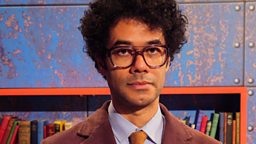
Richard Ayoade - Tenth of December by George Saunders
The cover says:
I think he is the greatest writer since Salinger.
George Saunders’s most wryly hilarious and disturbing collection yet, Tenth of December illuminates human experience and explores figures lost in a labyrinth of troubling preoccupations.
A family member recollects a backyard pole dressed for all occasions; Jeff faces horrifying ultimatums and the prospect of Darkenfloxx™ in some unusual drug trials; and Al Roosten hides his own internal monologue behind a winning smile that he hopes will make him popular.
With dark visions of the future riffing against ghosts of the past and the ever-settling present, this collection sings with astonishing charm and intensity.
Richard says:
It's a collection of short stories. In some ways, his stories could be seen as dystopian, or they're set in strange near-future worlds. There’s one story where people are injected with drugs to experience different emotions, and then they're monitored. There's another story called The Semplica Girls, in which women from disadvantaged countries are suspended decoratively in gardens by micro lines through their heads. And so the worlds are really strange and terrifying, but where, I think, he’s cracked the code of it, is by staying very relatably in people's heads, and people who've just slightly got out of their depth and don't trust themselves. The stories seem to really be about class in America and about materialism and how people are willing somehow to live a less spiritually satisfying life in exchange for the pursuit of evanescent things. I think he is the greatest writer since Salinger.
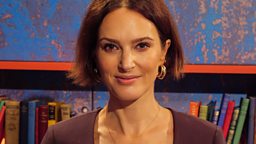
Elizabeth Day - The Light Years by Elizabeth Jane Howard
The cover says:
My favourite kind of book is something that uses the family unit as a microcosm to examine broader issues and she does that so brilliantly.
Every summer, the Cazalet brothers – Hugh, Edward and Rupert – return to the family home in the heart of the Sussex countryside with their wives and children. There, they are joined by their parents and unmarried sister Rachel to enjoy two blissful months of picnics, games, and excursions to the coast. But despite the idyllic setting, nothing can be done to soothe the siblings’ heartache.
Hugh is haunted by the ravages of the Great War, Edward is torn between his wife and his latest infidelity, and Rupert is in turmoil over his inability to please his demanding wife. Meanwhile, Rachel risks losing her only chance at happiness because of her unflinching loyalty to the family.
Elizabeth says:
This is the first in what was a quartet of books, but shortly before she died, she wrote an extra book, so it's actually a quintet now, and it spans the generations of this single family, the Cazalets.
The Light Years is the first book, and it opens in the 1930s and they are going to this family home for the summer, as they have done many years previously, but the drum beat of the Second World War is in the background. And so what Elizabeth Jane Howard does brilliantly, is she's so exceptional at writing about dynamics between people in families and how four siblings, there are three men and one woman can have completely different experiences of what that family means to them and completely different life experiences. And she manages to shift perspective so easily between all of them and at the same time, this huge thing is happening on the global scale.
My favourite kind of book is something that uses the family unit as a microcosm to examine broader issues and she does that so brilliantly. And the other reason I chose this is because I still believe she's an underrated author. She's so phenomenal at what she does. Hilary Mantel was an admirer and she was married to Kingsley Amis, who famously wrote Lucky Jim. In her lifetime, his reputation overshadowed hers, and it was partly because she was doing what women of that generation did, which was doing a great job keeping house and making sure he had boiled eggs in the morning. And so that's why I'm passionate about talking about Elizabeth Jane Howard any opportunity I get.
